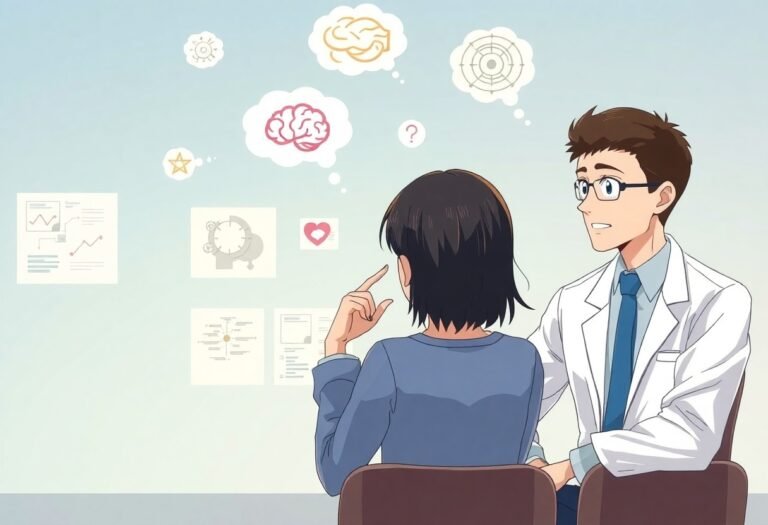Art and Music Therapy in Mental Health
Just as the body needs exercise, your mind requires creative outlets to heal and thrive. Art and Music Therapy in Mental Health are effective techniques that utilize creative expression to help you process emotions, reduce anxiety, and improve your overall mental well-being. These therapies not only offer a safe space for self-exploration but can also foster connection and understanding, making them powerful tools in mental health. In this post, you’ll learn how engaging in these artistic practices can significantly benefit your mental state and enhance your emotional resilience.
Key Takeaways:
Understanding Art and Music Therapy in Mental Health can provide insights into how creativity plays a vital role in emotional healing and psychological support.
- Art and music therapy provide non-verbal avenues for expression, helping individuals articulate feelings and experiences that may be difficult to communicate verbally.
- Engagement in creative activities can lead to improved mood, reduced anxiety, and enhanced overall well-being in various populations, including those with depression and PTSD.
- Therapeutic interventions often foster a sense of connection and community, promoting social skills and support among participants.
- Art and music therapy can serve as adjunct treatments alongside traditional therapies, enhancing the efficacy of mental health care and promoting holistic healing.
- Practitioners can tailor sessions to meet the unique needs of individuals, allowing for personalized therapeutic experiences that resonate with the client’s interests and preferences.
Understanding Mental Health
While mental health refers to your emotional, psychological, and social well-being, it significantly influences how you think, feel, and act. It also affects how you handle stress, relate to others, and make choices. Recognizing the importance of mental health is vital, as it plays a vital role in your overall health and quality of life.
Definition and Importance
An understanding of mental health encompasses your emotional resilience and coping mechanisms. It is vital for maintaining a balanced life and contributes to your ability to perform daily activities, foster relationships, and pursue personal growth.
Common Mental Health Disorders
Against the backdrop of understanding mental health, various conditions can affect it. Examples include depression, anxiety disorders, and bipolar disorder, among others. You may experience symptoms such as persistent sadness, mood swings, or overwhelming anxiety that disrupts daily functioning.
The impact of common mental health disorders on your life can be profound. Depression, for instance, can lead to feelings of hopelessness and difficulty in social situations, while anxiety disorders can manifest as excessive worry and fear that hinder your daily activities. Seeking help is important for recovery and managing these conditions effectively, enabling you to reclaim a fulfilling life.
Overview of Art Therapy
Some individuals find that art therapy serves as a valuable tool for self-expression and discovery. Designed to facilitate emotional healing, art therapy encourages participants to explore their feelings through various creative mediums. This approach can address a wide range of mental health issues, including anxiety, depression, and trauma, providing you with an alternative avenue to articulate your thoughts and emotions without the constraints of traditional talk therapy.
Principles and Techniques
By combining artistic expression with psychotherapy, art therapy relies on core principles such as creativity, process over product, and emotional exploration. Techniques often include drawing, painting, sculpting, and collage to help you engage with your inner world, allowing feelings and thoughts to manifest in tangible forms. This non-verbal approach can be particularly beneficial if you struggle to express yourself through words alone.
Benefits for Mental Health
Around the world, art therapy has been recognized for its positive impact on mental health. It fosters emotional resilience, enhances self-awareness, and aids in processing trauma. Through creative exploration, you may find relief from stress and anxiety while gaining a healthier perspective on your feelings and experiences.
In addition, art therapy promotes self-acceptance and self-esteem, as engaging in creative activities allows you to explore your identity without judgment. You might discover newfound coping strategies that help alleviate symptoms of mental health conditions. Furthermore, the therapeutic process of sharing your artwork with a trained therapist can foster a sense of connection and support, ultimately leading to improved emotional well-being. This form of therapy becomes a safe space where you can explore emotions, making it a powerful tool in your mental health journey.
Overview of Music Therapy
Now, music therapy is an evidence-based therapeutic approach that uses music interventions to address emotional, cognitive, physical, and social needs. By engaging clients in various musical activities, licensed music therapists tailor experiences to encourage healing and personal growth. Whether it involves listening, composing, or playing instruments, music therapy fosters a supportive environment that empowers you to explore your feelings and enhance your overall well-being.
Principles and Techniques
About the principles of music therapy, it is grounded in the understanding that music can influence emotions and behaviors. Techniques may include improvisation, song writing, guided imagery, and active music-making. Therapists adapt these techniques to suit your individual needs, allowing for a highly personalized approach that respects your unique journey towards mental health.
Benefits for Mental Health
To fully appreciate music therapy, consider its various benefits for your mental health. Engaging in music therapy can help reduce anxiety, improve mood, enhance emotional expression, and foster social connections. The therapeutic process empowers you to confront feelings and experiences through a creative outlet, making it easier to navigate life’s challenges.
Plus, music therapy provides a safe space for you to explore your emotions, and the transformative power of music can lead to profound changes. Studies show that participating in music therapy can significantly lower levels of stress and depression, promoting overall mental clarity and improved coping strategies. By immersing yourself in this therapeutic process, you can gain valuable insights into your emotional landscape while fostering a sense of community and connection that is important for your personal growth.
Comparative Effectiveness of Art and Music Therapy
Keep in mind the unique benefits each therapy offers. While both art and music therapy contribute positively to mental health, they may serve different purposes and resonate with individuals in varying ways. Evaluating the comparative effectiveness can help you determine which approach aligns best with your personal healing journey. Below is a summary of their distinct characteristics.
Comparison Table
| Art Therapy | Music Therapy |
|---|---|
| Focuses on visual expression and creativity | Utilizes musical activities and listening |
| Helps in processing emotions through art creation | Enhances mood and alleviates anxiety via music |
| Encourages tactile involvement | Develops auditory skills and rhythmic ability |
Empirical Studies and Findings
Among various research efforts, studies reveal that both art and music therapy yield significant improvements in mental health outcomes. Research indicates that individuals undergoing art therapy demonstrated a 70% increase in emotional expression, while music therapy participants reported a notable 60% reduction in anxiety levels. Understanding these findings can empower you to make an informed choice about which therapy to pursue.
Case Studies and Real-Life Applications
Along with empirical studies, practical case studies illustrate successful applications of art and music therapy. These real-life examples showcase how individuals experience tangible benefits from each therapeutic approach, confirming your potential for positive change through these means. Here are some notable cases:
- Case Study 1: A 30-year-old woman reported a 75% improvement in her anxiety after 12 weekly sessions of art therapy.
- Case Study 2: A 50-year-old man found a 65% reduction in depressive symptoms through music therapy within three months.
- Case Study 3: A group of teens experienced a 80% increase in social interaction after participating in combined art and music therapies.
Consequently, the data reveals the impactful role that art and music therapy can have on individuals seeking healing and empowerment in their mental health journeys. By considering these practical examples and outcomes, you can better assess how these therapeutic modalities may serve your specific needs. Each approach offers distinct benefits; thus, evaluating your preferences will be instrumental in achieving your mental wellness goals.
Integration of Art and Music Therapy in Treatment Plans
Once again, integrating art and music therapy into treatment plans can significantly enhance your mental health journey. These modalities not only provide a unique avenue for self-expression but also promote emotional healing. By incorporating creative methods with traditional therapeutic practices, you can effectively address your mental health challenges while experiencing the joy of artistic exploration.
Collaborative Approaches
Above all, collaborative approaches between art and music therapists facilitate comprehensive care tailored to your needs. By working together, these professionals can create harmonious treatment plans that address emotional, psychological, and developmental aspects of your mental health. Engaging with both therapies allows for a richer understanding of your experience and fosters a supportive environment for healing.
Individualized Treatment Strategies
Below, individualized treatment strategies are necessary in ensuring that your unique mental health needs are met. By taking into account your personal preferences, challenges, and goals, therapists can design tailored interventions that combine the benefits of art and music therapy. This customized approach empowers you to take an active role in your recovery, allowing for enhanced self-discovery and coping mechanisms.
The individualized treatment strategies you receive will be designed based on a thorough assessment of your specific situation and preferences. This means that your sessions will utilize a blend of art and music therapy techniques that resonate with you, ensuring meaningful engagement in the process. By recognizing your unique strengths and challenges, these personalized interventions aim to boost resilience and help you develop effective coping skills. This tailored approach can lead to deeper emotional catharsis and greater overall satisfaction in your mental health journey.

Challenges and Limitations
Not all individuals experiencing mental health challenges respond positively to art and music therapy. Variability in personal preferences, cultural backgrounds, and mental health conditions can impact the efficacy of these therapies. Additionally, the availability of qualified therapists and sufficient funding can hinder access to these beneficial services, leaving many without support. Overcoming these obstacles is important to enhance the therapeutic landscape.
Barriers to Implementation
Any attempt to implement art and music therapy faces several barriers, including limited awareness among healthcare providers and financial constraints that restrict access to trained professionals. In many regions, there is also a lack of established protocols and evidence-based practices that can lead to hesitance in integrating these therapies into traditional mental health treatments.
Future Directions in Research
Above all, future research should focus on exploring the long-term effects of art and music therapy on various mental health conditions. Investigating patient demographics can help identify which groups benefit the most and which specific interventions yield optimal outcomes. Furthermore, studies could examine how integrating new technologies, such as virtual reality or digital arts, can enhance the therapeutic experience.
Also, it is important to conduct large-scale studies that adequately represent diverse populations, as this can enhance the generalizability of therapy results. Collaborating with academic institutions and mental health organizations can facilitate more refined approaches to therapy, increasing patient engagement and retention rates. By identifying the mechanisms behind the positive impacts of art and music therapy, you can contribute to establishing standardized practices that could revolutionize mental health treatment.
Final Words
Conclusively, engaging in art and music therapy can significantly enhance your mental health and well-being. These therapeutic modalities provide you with creative outlets to express emotions, process experiences, and foster self-discovery. By incorporating artistic and musical practices into your routine, you can alleviate stress, improve your mood, and develop healthier coping strategies. Embrace these therapeutic tools to enrich your journey towards mental wellness and empower yourself in navigating life’s challenges.
FAQ
Q: What is Art Therapy and how does it benefit mental health?
A: Art therapy is a therapeutic practice that utilizes creative expression to help individuals explore their emotions, reduce anxiety, and improve self-esteem. By engaging in artistic activities, participants can communicate feelings that may be difficult to express verbally. This therapeutic approach promotes healing by allowing individuals to process trauma, cope with stress, and gain insights into their mental health, ultimately contributing to a greater sense of well-being.
Q: How does Music Therapy contribute to emotional healing?
A: Music therapy involves the use of music in a therapeutic context to address emotional, cognitive, and social needs. It can help reduce feelings of sadness, anxiety, and stress by promoting relaxation and emotional expression. Whether through listening to music, songwriting, or playing instruments, individuals can find a safe space to express their feelings and navigate their mental health challenges. Music therapy also enhances communication skills and promotes cognitive functioning through rhythmic and melodic engagement.
Q: Can Art and Music Therapy be used for specific mental health conditions?
A: Yes, both art and music therapy are effective for various mental health conditions such as depression, anxiety, PTSD, and autism spectrum disorders. These therapies can be tailored to meet the unique needs of individuals experiencing specific challenges. For example, individuals with PTSD might use art therapy to visualize and process traumatic experiences, while those with anxiety may find solace in music therapy techniques that emphasize calming musical elements to ease their fears and promote relaxation.
Q: What should one expect during an Art or Music Therapy session?
A: During an art therapy session, participants may be guided by a licensed therapist to explore different art materials and create pieces that reflect their feelings. The therapist may facilitate discussions about the artwork to help individuals gain insights. In music therapy, participants can expect to engage in activities such as songwriting, improvisation, or listening exercises. The therapist will create a supportive environment where individuals can express themselves freely. Sessions are catered to individual interests and therapeutic goals, making them unique experiences for each participant.
Q: How can someone find a qualified Art or Music Therapist?
A: To find a qualified art or music therapist, individuals can start by seeking referrals from mental health professionals or healthcare providers. Additionally, organizations such as the American Art Therapy Association and the American Music Therapy Association provide directories of certified therapists. It is important to ensure that the therapist has the appropriate credentials and experience in handling specific mental health concerns. Initial consultations can also help individuals to determine if the therapist’s approach aligns with their needs and goals.







